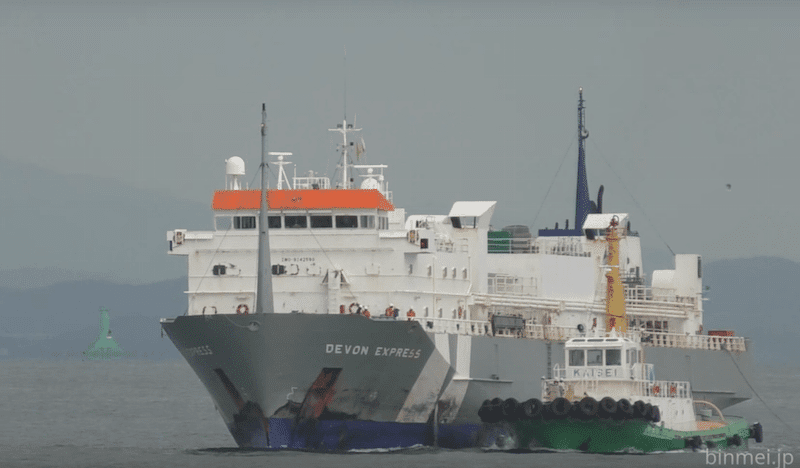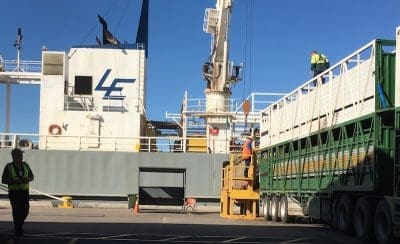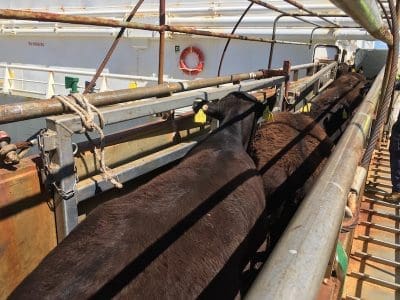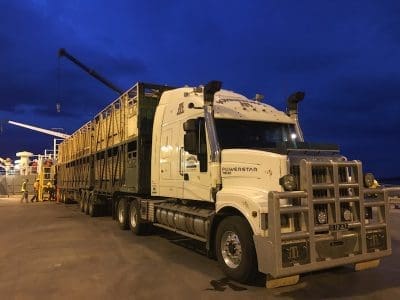
The Devon Express carrying the first consignment of F1 Angus Wagyu steers and heifers from Australia following the lifting of the recent trade suspension arrives at the Shin Moji Port in Japan.
FOR more than 15 years a small but reliable shipping trade to Japan has been the backbone of Australian’s first-cross Wagyu industry.
After a major setback earlier this year, the trade is now back on its feet and running smoothly again, with a second shipment of F1 Angus Wagyu steers leaving the Port of Brisbane bound for Japan on the weekend, as these pictures show.
Every five weeks or so since the late 1990s a ship has left Queensland for Japan carrying around 1000 F1 Angus Wagyu steers and heifers, weighing 270-300kg on average.
Upon arrival in Japan the cattle are fed for 500 days for a major supermarket chain around Osaka.
Taking 10,000 cattle year-in, year-out, the regular trade has provided a valuable market and important price-setting role for Angus-Wagyu cattle producers from Tasmania to Central Queensland.
That was until late May this year when a consignment of Australian dairy cattle tested positive to Bovine Johne’s Disease after arriving in the market, resulting in a blanket ban being imposed on all Australian cattle imports to Japan.
Despite having no involvement in the incident that caused the ban, the Wagyu cattle trade was suspended as well.
The $14 million-a-year F1 Wagyu trade was stopped in its tracks for three months until the Japanese Government agreed to lift the ban in late August.
Despite being unable to ship cattle, exporter Edwards Livestock had to continue buying and accumulating cattle during that ban to protect its long-term relationships with its suppliers, as other feedlots circled to try to secure their cattle during the disruption.
Edwards Livestock’s long-term customer in Japan, a major supermarket chain in the Osaka region, was also heavily impacted by the ban.
However, with the lifting of the ban on August 26, the exporter was able to prepare the delivery of a double consignment to help its customer restore numbers in its Japanese feedlot.
That shipment of 2280 F1 Angus Wagyu steers and heifers departed Brisbane on September 28, and are now on feed in Japan (video below shows the Devon Express carrying that consignment into Japan’s Shin-Moji Port.)
The Vroon carrier Devon Express filmed arriving in the Japanese Port of Shin-Moji from Brisbane on October 11.
Another 960 cattle were loaded and exported on the smaller Vroon vessel the Murray Express last Saturday.
Exporter Matt Edwards told Beef Central it had been a big relief to have cattle freed up and moving again.
“Everyone is back at work and finally getting paid again,” he said.
“It has been a big impact.
“We had plenty of feedlots trying to attack our supply chain while the ban was on and use negativity against us during that time.
“But we are back up and running again now, which is significant.”
Asked how the current high price of cattle in Australia is impacting the Wagyu trade to Japan, Mr Edwards said he believed it would impact on demand next year.
“High prices will certainly impact Japan going forward as there is more inquiry for supply in the 2017/18 year, but unsustainable prices will lessen this interest,” he said.
“Australia needs to be at a pricing level that is competitive with the rest of the world.
“Good seasons, pushing the restocker trade to unsustainable levels, is going to be a Catch 22 in the immediate future.
“A strong Japanese live market is critical as they operate under five to 10 year marketing cycles, unlike our Australian meat markets that push the supply and demand barrow.”



